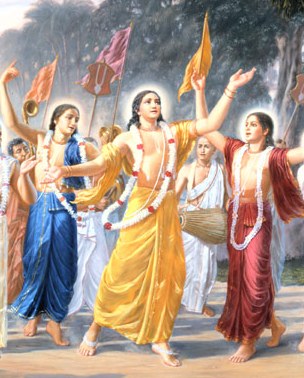Necessity of Bhajan
DHYAAYAN KRUTE YAJAN YAJNAI THRETHAAYAAM DWAAPARERCHAYAN YADAAPNOTHI THADHAAPNOTHI KALOW SANKEERTHYA KESAVAM

In Krutha Yuga, Threthayuga and Dwapara Yuga, to reach God, Tapas, Yagna, and Archana (Pooja) were the methods followed respectively.
In Kaliyuga Naama Sankeerthanam(Bhajan) is the way out. How simple a method compared to previous Yugaas! Our Rishis have foreseen that in Kaliyuga, there will be no time for people to engage (nor will they be interested) in religious activities due to pre-occupation. This is clearly brought out by this sloka:
In Kaliyuga, all jeevaas will be sunk in Kalmasha Chittha - i.e. Kaama, Krodha, Lobha, Moha, Mada, Mathsaryaadi Shatgunaas and will be full of anger, Egoistic, self-centered, with envious feelings etc. etc. Every one will have to be after aggrandisement of wealth and will be fully engrossed in pleasures that can be bought by money (materialistic pursuits). They will be bereft of any systematic, religious or pious activities and will be unsystematic in their approach. This is the fate accompli. No one can escape this law. Even to such persons, there is Mukthi promised, provided people chant/sing the name of Govinda, i.e. sing in praise of God and always engage in Naama Smarana. Every religious or philosophical activity is aimed at human evolution. What is it? The origin of every human being is the BRAHMAN, the Lord, who has no name, no form, no bondage, no birth and death and He is beyond the Kaala (time) & Desa (space) principle.
The human being called JEEVAATHMA, bound by Vaasanaas gets entangled in the MAAYA PRAPANCHAM (unreal world of matter) and in ignorance identifies himself with the material possessions and engages in aggrandisement of wealth and in enjoying the fleeting joys provided by such materialistic pleasures. He is thrown into the sea of Samsaara due to his materialistic pursuits which give him pleasure and sorrow alternately - pleasure when he enjoys the good results of his karma and pain when he suffers from the bad results. This is because he acts with expectation of certain results (pleasures) but when the act is imperfect, he gets pain.
Our scriptures declare that "as you sow so you reap". Every action (Karma) has a reaction (Phala) and the reaction is directly in proportion to the quality of the actions performed. Thus, human beings have control over their actions but not over the results, which is decided by nature (fate). Bhagawan Sri Krishna, in his Geethopadesam to Arjuna makes this principle clear by this sloka:
In fact, every action is guided by the characteristic of each human being, formed by action & reaction theory of past karmaas.
Every Karma is guided by the Vaasanaas (desires in rudimentary stage) and if we expect good results, our Vaasanaas should be pure, i.e. if we are materialistic, we get material pleasures or pains. if our actions are guided by philosophical principles prescribed by our Srutis and Smritis we shape up our Gunaas (quality) to be Saathwic. Saathwic actions produce Saathwic results. To shape up our Vaasanaas into pure ones, we should always think about our origin, which is beyond vaasanaas. Another way to purify ourselves is to caste away our poorva vaasanaas by burning them in the fire of Knowledge, which is achieved through Bhakthi - through the Bhajan sampradaaya.
- Achala Bhakthan .